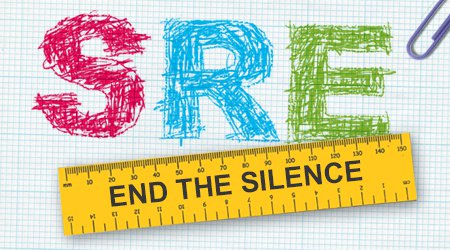Almost 100% of young people think sex and relationship lessons should be LGBT-inclusive
By Will Stroude

Leading sexual health charity Terrence Higgins Trust surveyed 900 young people aged 16-24 about the sex and relationship education (SRE) they received in school. While the results showed that the vast majority of young people thought that sex and relationship lessons were important, young people felt as though the lessons they did receive weren’t good enough:
- 99 per cent of young people surveyed thought SRE should be mandatory in all schools
- 97 per cent thought it should be LGBT-inclusive
- half of young people rated the SRE they received in school as either ‘poor’ or ‘terrible’
- 95 per cent were not taught about LGBT relationships
The majority of respondents also reported that several LGBT-specific subjects were not included in their SRE lessons:
- 75 per cent of young people were not taught about consent
- 95 per cent had not learned about LGBT sex and relationships
- 89 per cent were not taught about sex and pleasure
- 97 per cent missed out on any discussion around gender identity
- Three out of five respondents either didn’t remember receiving information on HIV in school (32 per cent) or didn’t receive information on HIV in school (27 per cent)
The chief executive of the Terrence Higgins Trust, Ian Green, told The Guardian: “The government’s quiet blocking of compulsory SRE will condemn another generation of young people to leave school armed with little to no information on issues like LGBT relationships, gender identity and consent.”
The Terrence Higgins Trust is now urging the government to rectify this and provide proper training and support to all teachers: “We will continue to fight for this, even though the current government do not want to deliver on it. It is crucial that we don’t fail our current and future generations of young people. Sadly, at the moment we are failing them.”

Back in Feburary 2016 the government rejected demands to make SRE lessons mandatory, saying that “The vast majority of schools already make provision for PSHE”.
“The Government is concerned that this would do little to tackle the most pressing problems with the subject, which are to do with the variable quality of its provision, as evidenced by Ofsted’s finding that 40% of PSHE teaching is less than good”.
Deborah Gold, Chief Executive of the National AIDS Trust, said at the time:“This means it will continue to be delivered according to the whims of individual head teachers rather than the needs of young people. We are extremely disappointed”.
